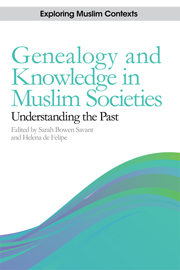Book contents
- Frontmatter
- Contents
- List of Figures and Tables
- Introduction
- Part One The Generation of Genealogical Knowledge
- 1 Keeping the Prophet's Family Alive: Profile of a Genealogical Discipline
- 2 Motives and Techniques of Genealogical Forgery in Pre-modern Muslim Societies
- 3 The Genealogy of Power and the Power of Genealogy in Morocco: History, Imaginary and Politics
- Part Two Empowering Political and Religious Elites
- Part Three Genealogy as a Source for Writing History
- About the Contributors
- Index
1 - Keeping the Prophet's Family Alive: Profile of a Genealogical Discipline
from Part One - The Generation of Genealogical Knowledge
Published online by Cambridge University Press: 05 September 2014
- Frontmatter
- Contents
- List of Figures and Tables
- Introduction
- Part One The Generation of Genealogical Knowledge
- 1 Keeping the Prophet's Family Alive: Profile of a Genealogical Discipline
- 2 Motives and Techniques of Genealogical Forgery in Pre-modern Muslim Societies
- 3 The Genealogy of Power and the Power of Genealogy in Morocco: History, Imaginary and Politics
- Part Two Empowering Political and Religious Elites
- Part Three Genealogy as a Source for Writing History
- About the Contributors
- Index
Summary
People call his [that is, ‘Ali ibn Abi Talib's] descendants the People of the House (Ahl al-Bayt), the Family of Muhammad (Āl Muḥammad), the Relatives of the Prophet (‘Itrat al-Nabī) … and employ the titles “sayyid” and “sharīf” to address them. Because people desire to be counted among them, the discipline of genealogies (‘ilm al-ansāb) and [its] family tree books (kutub al-shajara) came into being. In order to show them respect, the braids of hair [a special sign for sayyids and sharīfs] are removed from the impostors' heads.
Claiming kinship relation with the Prophet Muhammad, that is, claiming an affiliation to the “People of the House” or the status of a sayyid or sharīf, has arguably been the most widespread way in Muslim societies of supporting one's moral or material objectives with genealogical credentials. Today, the ruling dynasties of Morocco and Brunei, so distant from each other, both derive legitimacy in this same way. Many a Sufi and a saint are likewise believed to have been a sayyid or sharīf. Prophetic descent can even be an asset for beggars, since they can promise their benefactors a reward from the Prophet, in addition to that from God.
Respect or reverence for Prophetic descent, however, did not prevent some believers from trying to make false claims about it. Far from it: Impostors were everywhere, as suggested above by Ibn Shahrashub, an eminent Twelver Shi‘i scholar from the twelfth century ce. Paul Rycaut, a seventeenth-century British diplomat to the Ottomans, recounts that when a descendant of the Prophet wearing a green turban – a sign of that descent then and now – was caught drunk, the turban would respectfully be put aside and then the drunkard would be beaten severely. This was because it was widely known that Prophetic descent could easily be bought.
- Type
- Chapter
- Information
- Genealogy and Knowledge in Muslim SocietiesUnderstanding the Past, pp. 11 - 23Publisher: Edinburgh University PressPrint publication year: 2014



